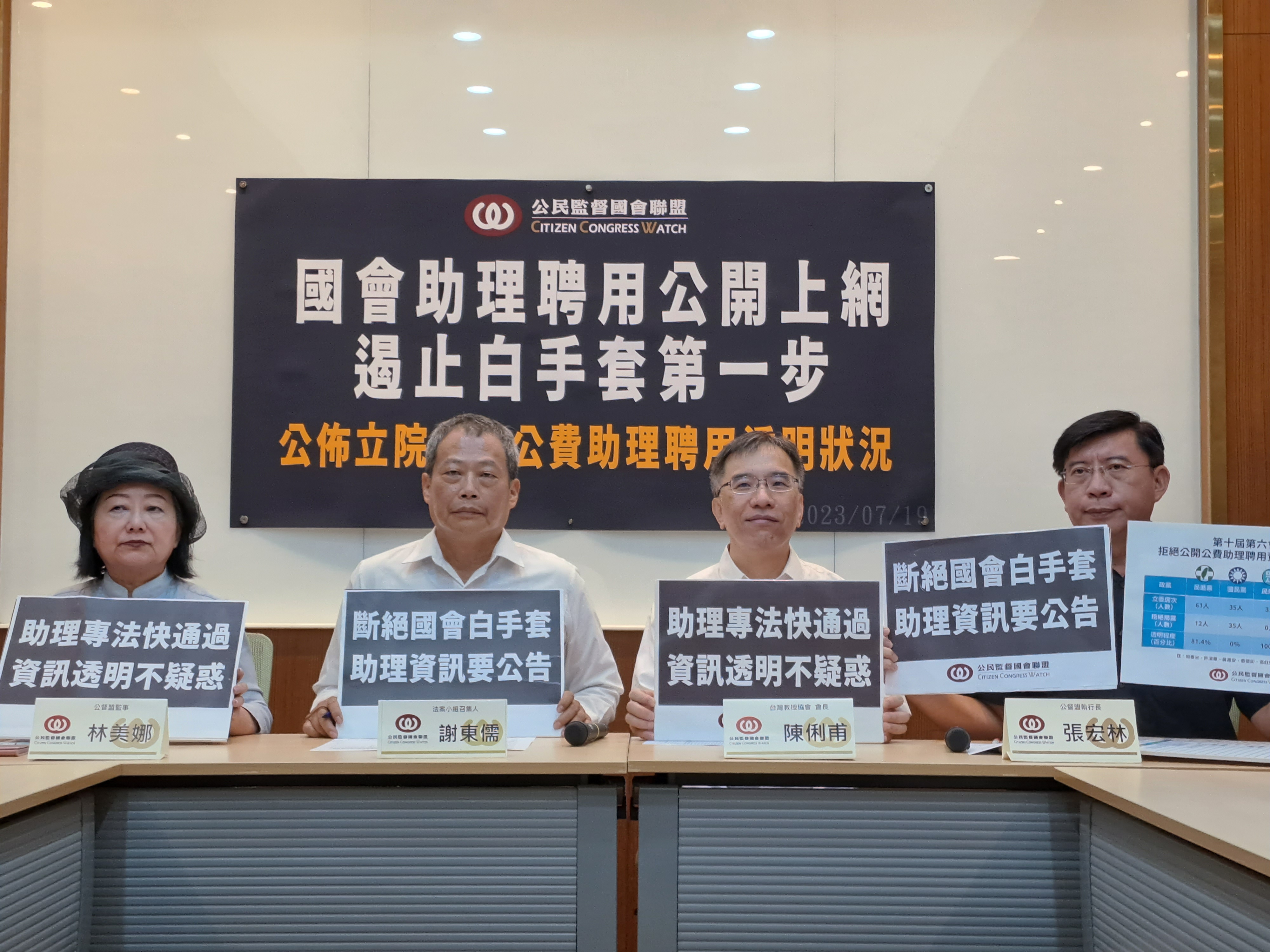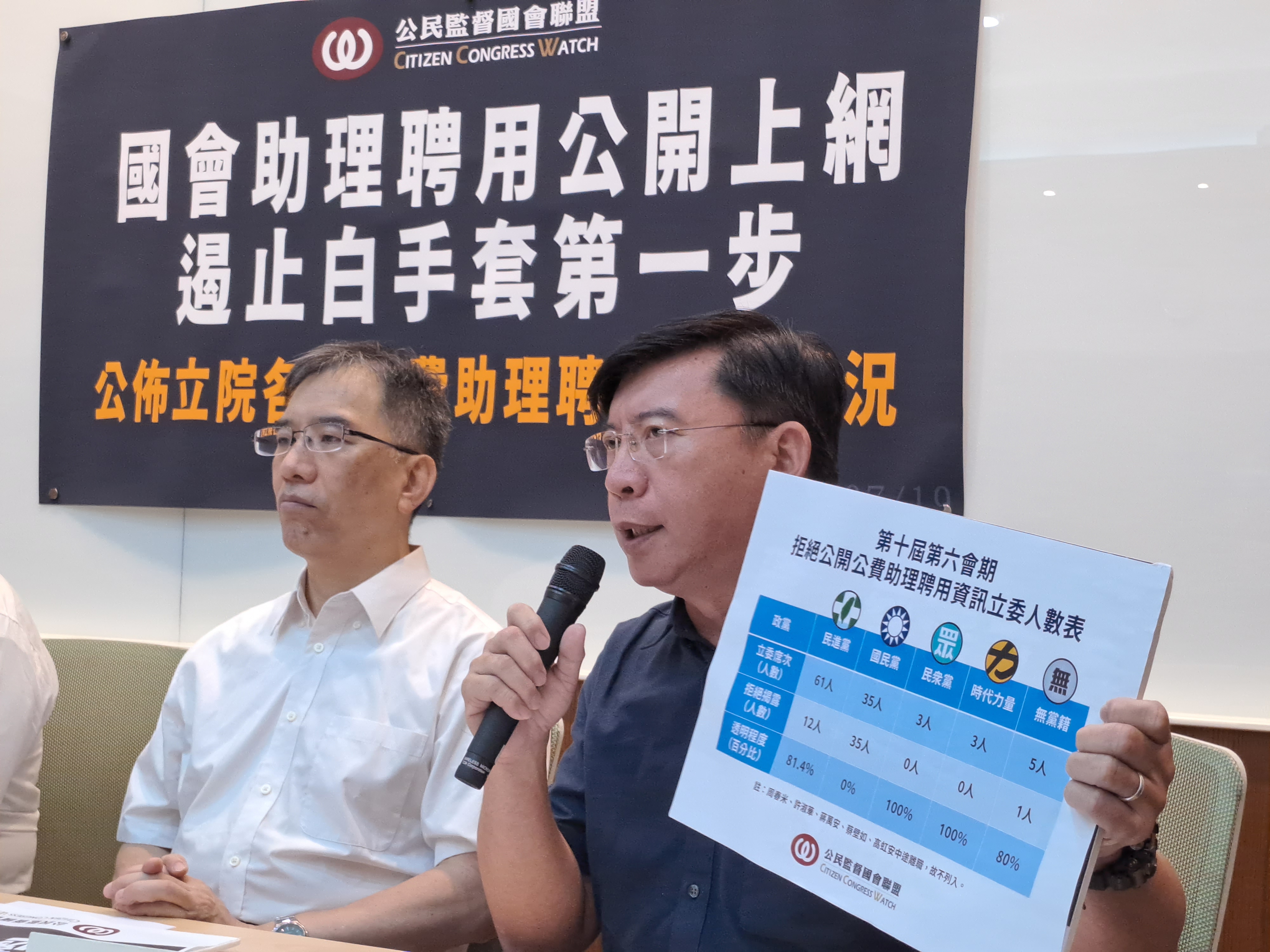Taiwan has a CRITICAL lack of transparency in the appointment of legislative staffers using public funds. We, as Citizen Congress Watch, believe that it is essential to publicly disclose the information of legislative staffers.
發布日期 2023.07.19

Taiwan has a CRITICAL lack of transparency in the appointment of legislative staffers using public funds. We, as Citizen Congress Watch, believe that it is essential to publicly disclose the information of legislative staffers.
Recently, the media reported allegations that a business operator bribed the Chief of the Road Construction Section of the Construction and Planning Agency through the office of legislator Jeng Tian-Tsair, involving millions of dollars. This case once again raises concerns about legislative staffers in Taiwan. Citizen Congress Watch has long advocated for the disclosure of publicly funded staffer appointments to increase transparency in parliament and prevent corruption. We aim to prevent a few bad apples from damaging the reputation of the many dedicated staffers in parliament. Specifically, in the evaluation of legislators, we suggest that legislators should disclose the information of their staffers appointed using public funds. However, in the sixth session, 48 legislators refused to disclose the relevant information, including 12 from the Democratic Progressive Party, 1 independent legislator, and 35 legislators from the Kuomintang, including legislator Zheng Tiancai, who refused to disclose the information on all his staffers appointed using public funds. This lack of transparency has undermined public trust in the Legislative Yuan. Citizen Congress Watch urges legislators from both the ruling and opposition parties to voluntarily disclose information on publicly funded staffer appointments until relevant regulations are fully improved. We believe that this is the bare minimum in resolving the controversy surrounding parliamentary staffers. We encourage the public to look over disclosures of conflicts of interest by legislators and closely monitor the progress of the “Legislative Staffer Employment Act,” aiming to establish a professional and transparent Legislative Yuan in Taiwan.
Citizen Congress Watch believes that disclosing information on publicly funded staffer appointments is only the first step in preventing scandals involving staffers. Even if legislative offices do not provide information to civil society organizations, as the primary representatives of public opinion, legislators have a responsibility to voluntarily disclose information on publicly funded staffer appointments on public platforms. Publishing the names and positions of all legislative staffers on the Legislative Yuan's website helps to prevent businesses from using a parliamentary middleman (or “white gloves” in Taiwan) to navigate the legal gray areas and mediate political-business relationships. It also prevents individuals from impersonating parliamentary staffers and defrauding the public, which could harm the image of the vast majority of diligent, honest, and professional parliamentary staffers. Citizen Congress Watch suggests that reference should be made to the parliamentary mechanisms of countries like the United States and Japan, where information on publicly funded staffer appointments is regularly made public. Additionally, we encourage the public to visit Citizen Congress Watch's official website to review the responses of legislators in the seventh session. Citizen Congress Watch plans to disclose the list of legislators who refuse to disclose information before the elections, aiming to combat the prevalence of "white glove staffers" in the parliament and calling on voters to collectively resist unforthcoming political parties and legislators.
Special Legislation for the Appointment of Parliamentary Staffers: No More Delays! Expedite the Removal of Incompetent Staffers
The adjustment of the legislative institution's publicly funded staffer system has long been a focal point of public attention and an important next step in "parliamentary reform." Over the past decade, only three proposals have been made regarding the enactment of special legislation for the appointment of parliamentary staffers. These proposals, put forward by legislators Huang Kuo-Shu and Hsu Chih-Chieh, are still awaiting review in the Judiciary and Organic Laws and Statutes Committee without any arrangements for public hearings to gather input from all parties.
In the current legislative session, both ruling and opposition parties have numerous members who have served as staffers themselves, and they should fully understand the seriousness of the lack of a legal framework to govern parliamentary staffers. Citizen Congress Watch strongly urges the Judiciary and Organic Laws and Statutes Committee to promptly schedule the review of the "Legislative Yuan Publicly Funded Staffer Appointment Act" in the remaining eighth session of the 10th Legislative Yuan. By institutionalizing the appointment of parliamentary staffers, we hope that comprehensive regulations governing the rights, obligations, and behavioral norms of parliamentary staffers will be established, thereby preventing legislators and parliamentary staffers from operating in legal gray areas.
Currently, the proposed versions of the parliamentary staffer appointment bill all include provisions stating that the Legislative Yuan should establish a publicly funded staffer roster and should publicly disclose information such as the names of staffers employed by each hiring unit on its website. If third-degree relatives are hired, it must be clearly indicated for public scrutiny. However, apart from information disclosure, the regulations regarding conflicts of interest for legislative staffers in our country are unclear and scattered across multiple statutes, and the Legislative Yuan has never initiated discussions on this issue. This situation has led to ambiguity in the exercise of public power, a mismatch in staffer responsibilities, and a compromising of national security. For example, legislators can hire personnel arbitrarily without regulations on salaries, leading to numerous cases of using fake staffers to embezzle staffer fees and salaries. Furthermore, although there is a limit on the number of staffers a legislator can have, there is no requirement to disclose the roster of all staffers, allowing "white glove" staffers to operate between politics and business without being officially listed or receiving remuneration. Looking at the parliamentary staff systems in various countries, it is evident that explicit regulations regarding conflict of interest and information transparency are in place. Citizen Congress Watch believes that only through transparent information disclosure can we effectively prevent unscrupulous businesses from using parliamentary "white glove" to launder money, improve the public's perception of parliamentary staffers, retain talented individuals in the Legislative Yuan, and enhance the professionalism of legislators' political inquiries. We believe that this is the key to resolving the long-standing chaos surrounding parliamentary staffers.
Citizen Congress Watch urges:
1.The salaries of publicly funded staffers come from hard-earned taxpayer money. Both the ruling and opposition parties must voluntarily disclose the information or provide it to Citizen Congress Watch for public disclosure on the internet.
2.The deadline for submission to the Citizen Congress Watch's legislators' information disclosure form is at the end of July. The results will be announced before the general elections, including the self-disclosure of the current legislators regarding the seventh session's staffer appointments. Voters are encouraged to boycott unforthcoming political parties and legislators.
3.The "Parliamentary Staffer Appointment Act" draft should be promptly scheduled for review, enabling the termination of employment for staffers involved in corruption or other offenses.
4.Premier You Si-Kun should promptly convene all parties in the ruling and opposition camps to complete the "Open Parliament Action Plan" in the remaining eighth session of this term. This plan should include the disclosure of information on legislators' conflicts of interest, as well as staffer appointments, on official websites.
